Spring, Summer, Fall, Winter… and Spring
Last month, I posted a preview of Rune Factory 5 detailing its first two hours and the opening dungeon. Mostly, I complained about how that just isn’t enough time to really get a feel for how a game of this nature is going to be. This is a franchise where you can easily put more than 100 hours into a single game without seeing everything it has to offer.
I needed more than two hours. Thankfully, after that preview went up, I got to spend the next several weeks immersing myself in this world. That’s more than enough time to really dig into the experience and unearth the good and the bad buried within.

Rune Factory 5 (Nintendo Switch)
Developer: Hakama Inc.
Publisher: Xseed Games
Released: March 22, 2022
MSRP: $59.99
If you’re tired of role-playing games featuring a protagonist with a crippling case of amnesia, I have bad news for you. The series staple trope is back with a vengeance in Rune Factory 5, which sees players exploring dungeons and slaying monsters as they try to save the world, get the guy or girl, and maybe build up an agricultural empire. The blonde-headed hero of this tale comes to the quaint town of Rigbarth following a monster attack in the woods. They can’t remember who they are or what their deal is, but it takes no time at all to find out that your hero is an Earthmate. Like with other games in the series, this means they have a special connection to nature and dragons, and stand as Rigbarth’s only hope in saving the town and the kingdom at large from a nefarious villain.
Someone or something is stealing rune power from the world, and that is throwing nature into disarray. As the hero of this tale, it’s up to you to figure out who’s behind the madness. But hey, no rush or anything. Saving the day can sit on the back burner as you grow level-10 tomatoes or try to catch that rare monster you so desperately need for your stables.
That’s because Rune Factory 5 employs an open-ended structure where you’re free to take the game at your own pace. If you don’t want to do some dungeon diving, you don’t have to. Those dungeons ain’t going anywhere, so you might as well take your sweet time and get yourself prepared for the challenge ahead by engaging in the wide array of side activities. From growing crops to catching monsters to crafting new tools and armor, there are very few doldrum days in the town of Rigbarth.
For veterans of the series, or even those hopping over for the first time from Story of Seasons or one of the other farming sims out there, none of this will be a surprise. The farming genre is very much about making your own schedule. If you’re coming into this game cold turkey, however, you might inadvertently go about proceeding through Rune Factory 5 in a less than ideal way. That’s because there’s nothing here that says you need to properly divide your time between farming and fighting, and it is possible to blow through most of the story before you ever see the first day of summer. Obviously, that’s not the ideal way to play the game. But it is a possibility, especially if you’re the type who likes to focus on a more structured game experience rather than an open-ended one. Your first few days in Rigbarth feature a slew of short tutorials that teach you about the many different aspects of the game. But with so much knowledge thrown out in such a short time, it’s really up to the player to sift through it and figure things out. And there is a lot to figure out here.
One of the first things you should learn in Rune Factory 5 is how to level up your skills. The good thing is, nearly everything in this game contributes to character growth. Even something as simple as walking or going to sleep at the end of the day will help you skill up. And those skills carry real results. Bathing at the bathhouse, for instance, is a skill that will increase your health points, rune points (action points), and vitality the more you do it. If you want to see greater benefits from love spells, you’ll need to increase your love skill. Fishing, chopping wood, talking to neighbors, watering crops, tending to your monster livestock, and opening treasure chests are just some of the everyday activities you’ll perform that’ll slowly ready your hero for the task at hand.
Building up your skills outside of battle will ultimately aid you when you do decide to dive into some dungeons. With increased health points and rune points, you’re more likely to survive the swarms of monsters awaiting you. However, as I found out the first couple of days of playing the game, even if you neglect all your activities outside of combat, you’re probably not going to have too much trouble getting through Rune Factory 5.
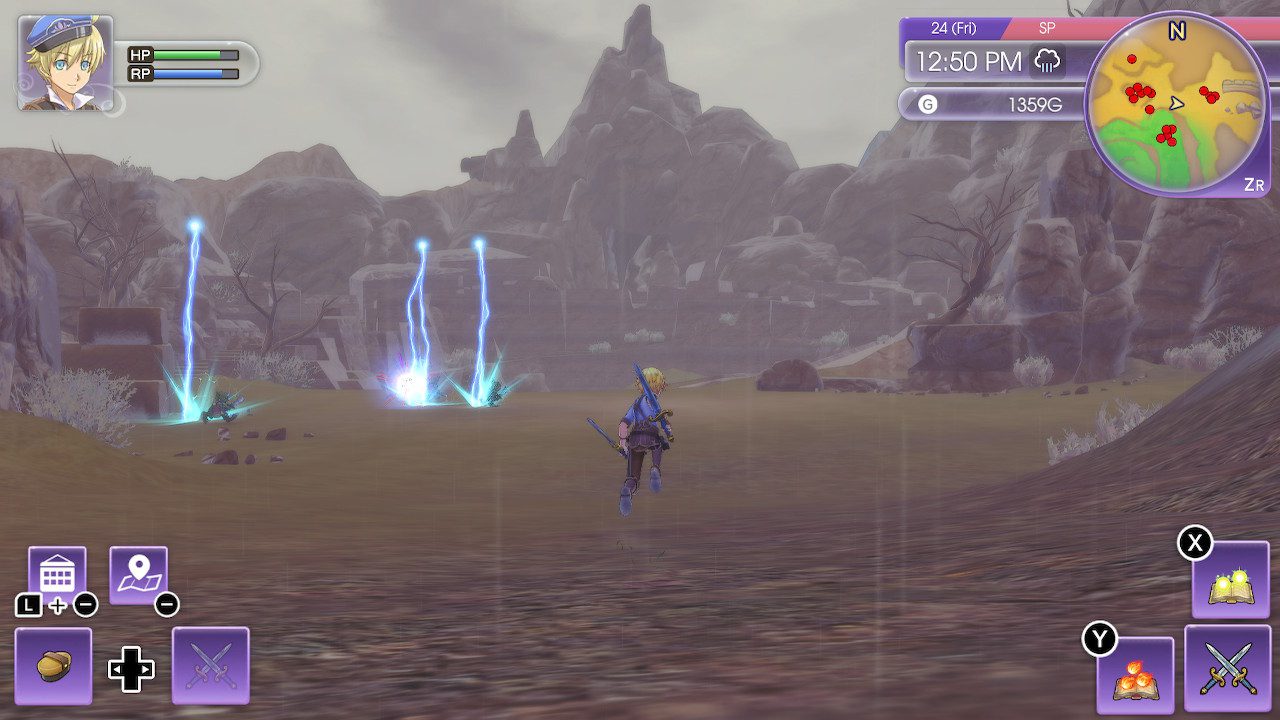
The dungeon-crawling side of Rune Factory 5 is extremely basic in its execution. The one-button combo combat doesn’t lend itself to much experimentation, and when you’re not smacking down one or two foes with a succession of strikes, you’ll likely be dodging attacks coming at you from off-camera. Unlike most of the games in the franchise, Rune Factory 5 does not have a fixed camera. Its position to the main character is close enough that it can be easy to take hits from enemies you can’t even see. And some of these hits can kill you in one shot. It’s annoying, but it’s workable, which is more than I can say about the auto-targeting system.
Rune Factory 5 just might have the worst auto-targeting system I have ever experienced. Truly awful, it is pretty unpredictable in not only which enemy it will target initially, but also which one it’ll shift to if you hit the right control stick. Will I target the monster in the center of my screen or the one closest to me? It’s honestly a crapshoot. I had rooms where I’d hit the auto-target button and it would lock onto a monster clear on the other side of the room with plenty of creatures standing between us. I only died a couple of times playing through the game–and Rune Factory 5 has a generous save system that’ll let you skirt death if you don’t mind restarting–but nearly all of those deaths can be attributed to the targeting system’s failure to focus on the appropriate enemy.
Equally as annoying in battle is what I’ll call the SEED savior system. For much of your adventure, your character is a member of SEED. The organization is responsible for investigating what’s happening with the rune energy as well as protecting Rigbarth from monster attacks. In the back corner of the Rigbarth SEED Outpost, a nondescript SEED officer stands at the ready. If you talk to them before you go exploring, they’ll agree to come aid you should you need their help. This means if you’re stricken with a status effect like sleep, they’ll pop in and restore you. They’ll also come to your aid if your health falls too low, and this is where I have a problem.
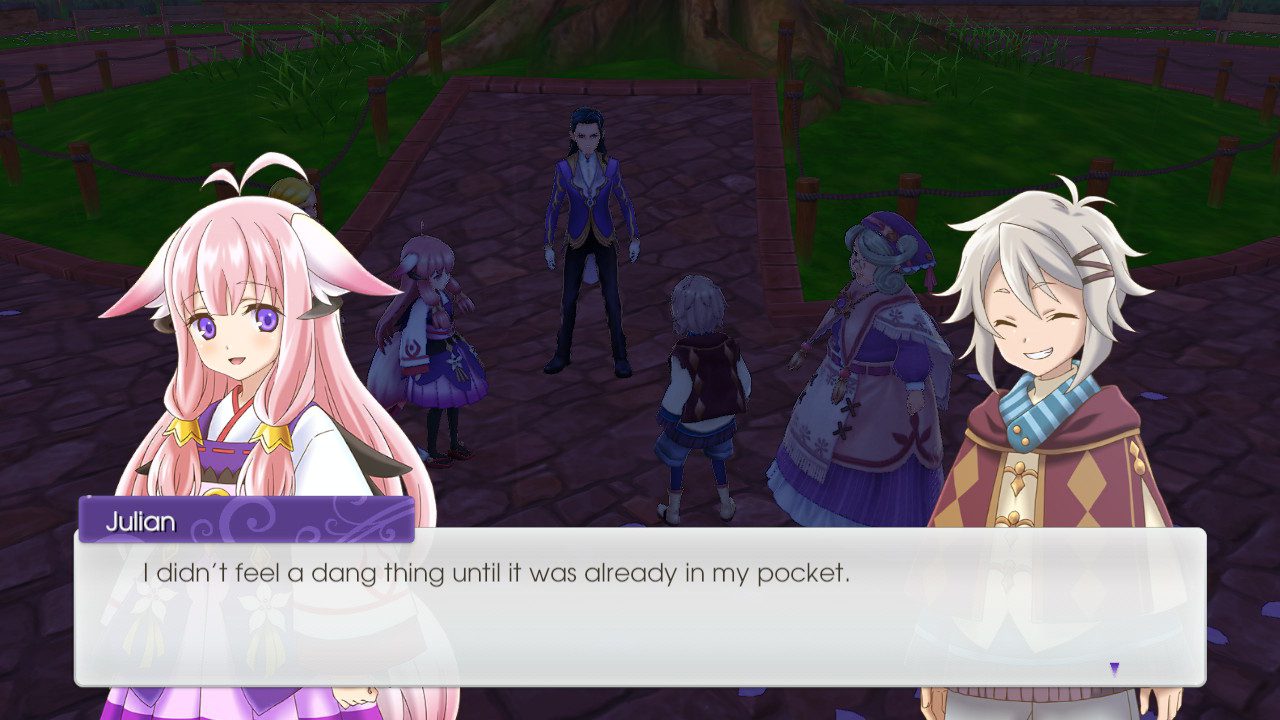
Because this SEED recruit has a lengthy recharge between rescues, I want to do my best to hold off the need for their aid until the situation is dire. However, they will pop in anytime my health falls below a certain point. And it’s not even a low point like I’m sitting there with only three health points remaining. I can still have a decent measure of HP left, but if it’s below this threshold, they’ll barge in. Not only is it annoying to lose this last-second save when I don’t need it, but the unpredictability of their arrival can actually throw me off my rhythm, leading to me taking some damage I probably wouldn’t have otherwise.
These two elements of combat can combine for a particularly frustrating experience, especially when playing on a harder difficulty level. But that’s pretty much the only way to see a consistent challenge from the game because most everything here doesn’t pose much of a threat. The dungeon bosses are big and bold, but there isn’t much variety between them. If you’ve recruited monsters or townsfolk to fight on your side, you can easily just let them do all the work while you lob spells at the beast from afar.
It’s actually kind of insane how much damage recruited monsters will do as they level up, and they can level up quite quickly. There is one dungeon in the game where I was joined by the first three monsters I captured. At the beginning of it, they barely posed a threat. By the end, they were doing more damage individually than I was with my strongest weapon. Inviting monsters and townsfolk along on your quest is obviously encouraged by the game’s design—and a central element in Rune Factory 5’s romantic ventures—but it pretty much breaks the combat, especially in those boss battles.

Because of this, as well as the repetitive nature of the dungeons and their far-too-simplistic puzzles, I didn’t really enjoy the combat half of this game. The hack ’n’ slash action works decently enough, but most battles just boiled down to me repeatedly dodging offscreen attacks and healing my companions as they took a brunt of the damage. Suffice to say, I had a better time with the farming sim half of the Rune Factory equation here, but even that side has its issues.
First and foremost, this is not really a pretty game. There is some interesting art direction, namely in the boss character designs and a few spots on the overworld map, but everything here looks a few generations old. There’s one corridor you’ll frequent on the northeast side of Rigbarth that honestly looks like it fell out of an early bargain bin Dreamcast game. The framerate never seems to hit a consistent 30 fps and will routinely take a dive every time you walk through a door. Elements in the world can take a long time to render in and it can sometimes feel as though the game is about to crash, but thankfully, that never happened with me. The worst error I ran into during my playthrough was when everyone in town started talking about a hurricane that was supposed to arrive tomorrow and it didn’t get there until two days later.
Rigbarth itself is pretty underwhelming. It feels as though the developers had a few ideas they wanted for this little burg but couldn’t figure out how to connect them in a natural way. The town is sparse and spread out with most of it remaining pretty dead for a good chunk of the calendar year. Special events and holidays will bring focus to certain parts of town, but these too are underwhelming. Artistically, most holidays don’t do anything more than paper the screen with confetti as the townsfolk stand around in a location outside their normal haunts for a dozen or so hours. Occasionally, you’ll have a mini-game or contest that’ll eat up about 30 seconds of your time. I was really disappointed when I reached my first Beach Day expecting some type of fun in the sun. Sadly, nobody was playing volleyball or surfing or any kind of activity that would require a unique animation. Instead, they just stood or sat around until the sun went down.
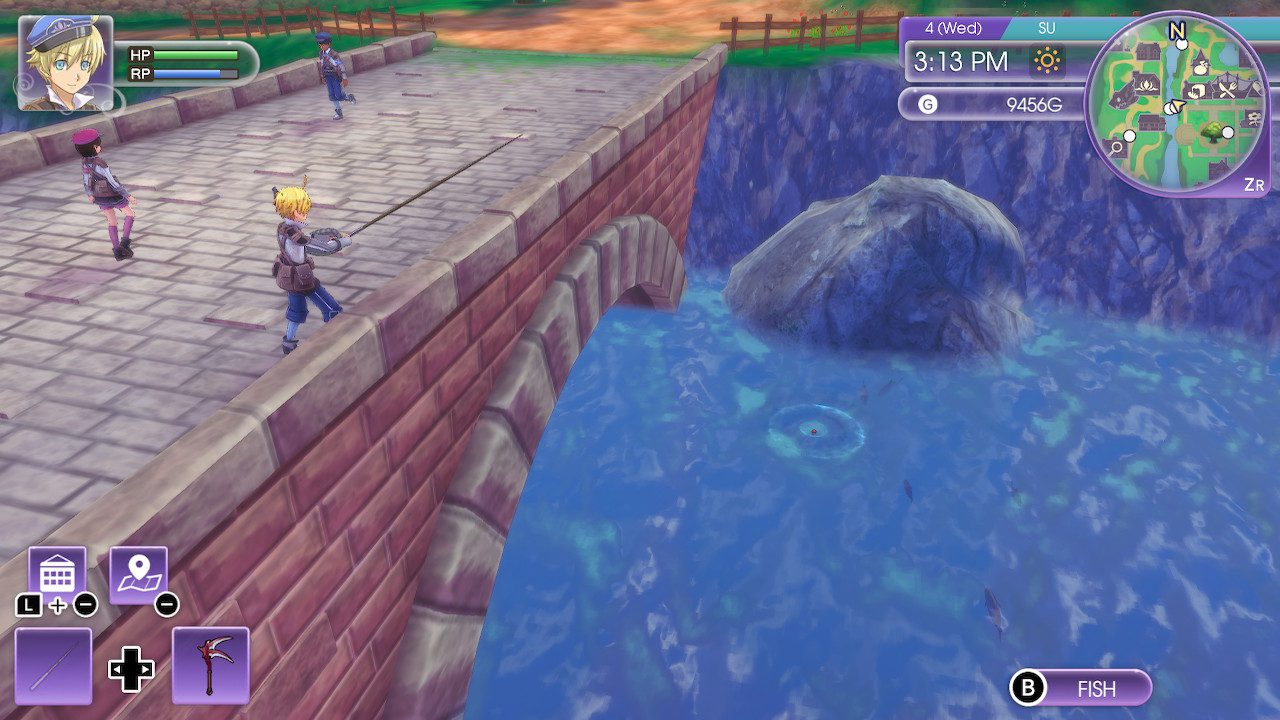
As disappointing as some of these holidays can be, it is worth getting out there and exploring Rigbarth every day as you might come across a unique cutscene that’ll bring you closer to the cast. The denizens of the town are a real bunch of winners in Rune Factory 5 and I have to complement the localization team for doing such a good job giving these characters some unique and dynamic personalities. One thing the game does well is it really gets you to learn about the people who populate this village, with little scenes that play out from time to time that reveal a bit more about each of them. If you’re ever around town and see a big red dot on the map, it’s marking the spot that’ll either advance the story or advance your relationship with the townsfolk.
The marriage candidates this time around are a pretty good bunch too, though you may want to hold off pursuing a partner until you’ve cleared a good chunk of the dungeons. As you advance through the story, more characters will arrive in town and some of them are better marriage material than those who initially call Rigbarth home. Getting to know these characters and beginning your romantic pursuits provides what I think are the best moments of the whole game. In fact, this is the first time I’ve played a game with a marriage option where I didn’t make an immediate beeline for my initial crush. I played the field a bit and the experience was all the better. Eventually, I settled on settling down with Reinhard, though it was a toss-up between him and wolf-man Murakumo. Rune Factory 5 is the first game in the series to include same-sex marriage, and you better believe I gayed it up whenever possible.
Feel free to take as much time as possible to meet your mate because you have a long road ahead of you. Each day in Rune Factory 5 takes more than 30 minutes to get through, which means you’re realistically looking at a 60- to 70-hour playtime to make it through a single calendar year. Obviously, that much time on the clock is good when you want to explore a dungeon or tend to your farm. However, on days where you’re supposed to stay up until a certain time to advance the story, it can be mind-numbingly slow.
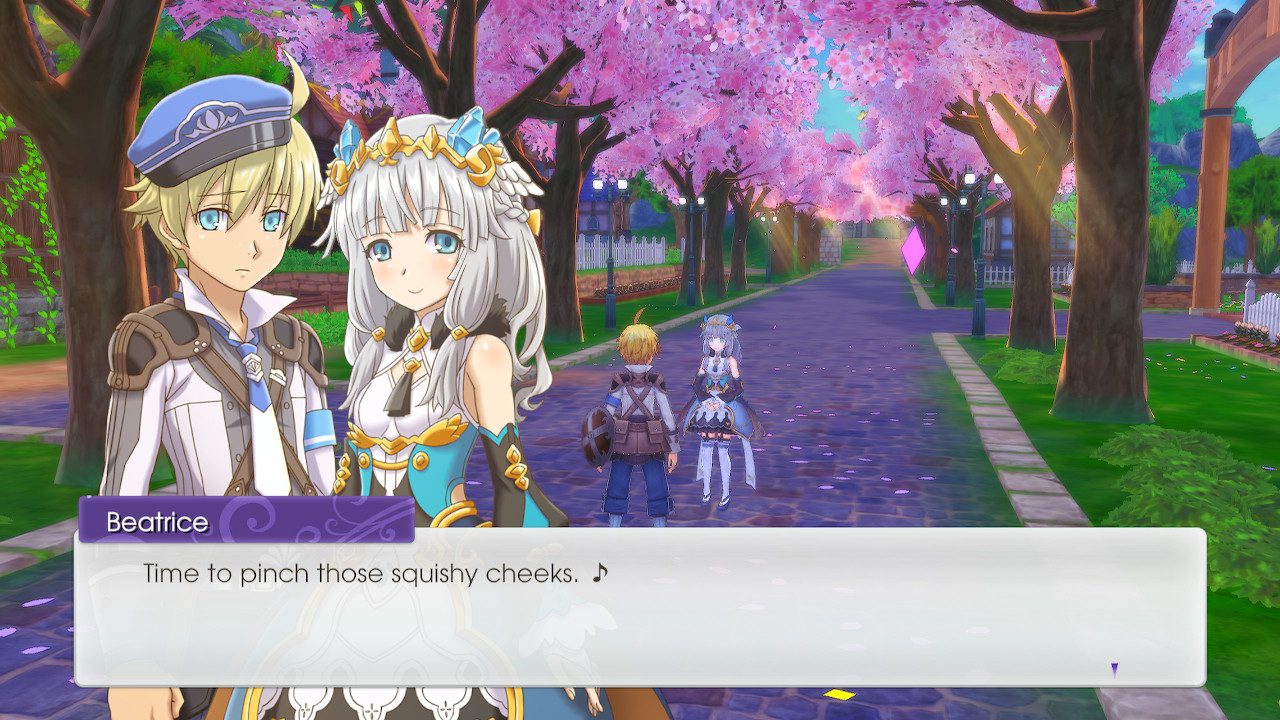
The best way to pass the time on the days like this is with farming. Growing crops and tending to fields works as well here as it has in any other Rune Factory game. There is a lot for players to keep track of, including soil quality and seed level, but you’ll learn best by doing. Your farming area will expand as you advance through the story, unlocking farm dragons where you can keep the monsters you recruit. Those monsters can be assigned to farm duties once you hit a certain relationship threshold with them, making it pretty easy to keep an efficient farm running. Just make sure you have enough fodder to feed them, something the game really doesn’t stress as much as it should.
If it sounds like I’ve hammered down too much on how little information the game gives you, it’s because I believe Rune Factory 5 is inadequate in providing the necessary knowledge to the player. The little bits of info you can access are too sparse and some of the requests you take from villagers don’t give enough information for new players or those, like me, who may need a refresher on everything after not playing a Rune Factory game for nearly a decade. Like I said above, there is a lot to keep in mind here with all the different aspects of farming, fishing, fighting, and raising monsters, and I just wish the game included a more detailed glossary to assist players who may need some extra help.
I also wish this game didn’t have so many weird and outdated design choices. Like, at the SEED Outpost, there is a magical talking box doll named Eliza who you can speak to when you want to schedule festivals for the town or change the game’s difficulty. With those types of options, you’d think Eliza would also be capable of handling name changes and giving you information on your monsters. But that isn’t the case. Instead, the developers constructed a house in the town and created two NPCs whose sole existence is to perform those two tasks. That just seems like a waste of time, space, and money for something that could have easily been taken care of by the magical talking box.
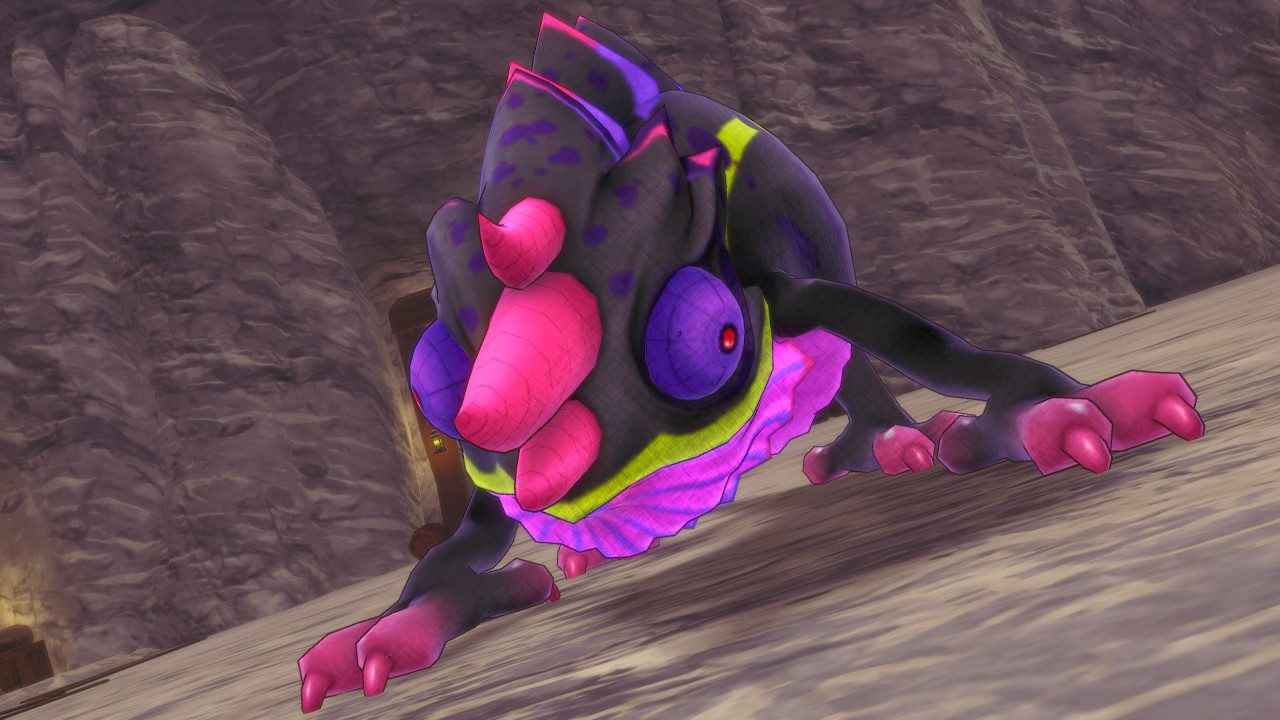
That’s just one example, but there are a lot of elements I came across throughout my adventure that I just wish would have been given more time and thought before the developers settled on the design they did. I’m talking about things like furniture placement lacking a grid for precise placement or recipe bread really restricting how many recipes players can learn every day or having to craft several different cooking surfaces to account for all the different cooking styles instead of just repeatedly expanding the same one. The L pocket, which gives you quick access to your bag, is not nearly as intuitive as it could be, and while time does stop when searching through your things, you may find yourself scrolling relentlessly to find the one item you’re looking for.
There’s more, but I don’t want to bog down this already too-long review with nitpicking. If you’ve read through what I’ve written and are coming away with the idea that I don’t like this game, that’s not the case. I do like Rune Factory 5. It has a great cast, a wealth of activities, and much of the farm sim experience I love. But every time I found myself smitten with the game, something would come along to point out just how underwhelming it is as a whole.
For those who are already fans of the Rune Factory series, I imagine any complaints I’ve listed above might be easy to overlook. For everyone else, you may want to try your hand at a previous entry in the franchise to see if you even like Rune Factory’s combination of farming and fighting before giving this one a go.
[This review is based on a retail build of the game provided by the publisher.]














Published: Mar 22, 2022 02:01 am